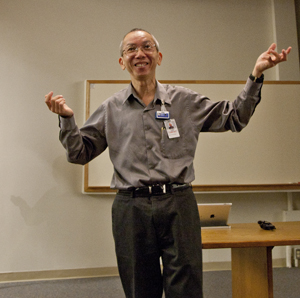APAHM speaker shares behind the scenes of 'Survivor'
 (Download Image)
Yau-Man Chan Photo by Jacqueline McBride/LLNL
(Download Image)
Yau-Man Chan Photo by Jacqueline McBride/LLNL
But it's been five years since he first was as a contestant on "Survivor" filmed in Fiji in 2007, and four years since he returned to the show set in Micronesia in 2008, so Chan is now free to tell what really happened behind the scenes of Survivor, one of the most popular TV reality shows now in its 24th season.
Chan, a chief technology officer of the College of Chemistry at UC Berkeley, visited the Lab this week as part of Asian Pacific American Heritage Month (APAHM) and talked about his background, culture and how he was picked to be on Survivor.
Born in Hong Kong, his family moved to Borneo when he young. He came to the United States in 1970 to attend college.
Chan said he was approached by the show's scouts who were seeking diverse cast members and caught up with him when he was a table tennis coach at Berkeley. "There are few Asians on the show. So many are self conscious about their image," he said, admitting that his mother was worried how the show might affect his reputation. "They got two for one," he joked about being selected. " I am Asian and I am old."
Chan spoke about the original Survivor, which started in Europe as "Robinson Crusoe Island." Today's series' premise sounds simple: people from all walks of life are brought together in a remote area, form teams and compete to see who can outlast the others by winning a series of challenges and avoid getting "voted off the island." This is all done while cameras are rolling. He also mentioned that the show is an example of John Nash's game theory and a study in strategic decision making.
It was TV producer Mark Burnett who purchased the show for an American audience, with a caveat to only feature U.S. citizens as contestants. The show began in 2000 at its first location -- Borneo, and basically gained popularity because of timing. As a reality show, it was unscripted with no need for writers. And, as fate would have it, that year, the Hollywood writers were on strike. Thus, Survivor not only survived, it thrived.
Chan explained how reality show members are cast. They go for all the stereotypes, he said, like the loud mouth jerk and the dumb blonde, believing that with such diverse personalities living together, there are bound to be conflicts, which the viewers enjoy. And, to identify personality types, potential contestants are required to undergo extensive questioning and testing.
Once the show is in progress, psychologists remain on the set to monitor the contestants' well-being.
Chan revealed that during the initial taping of the show each season, most contestants start out as non-talkative. They are guarded because of the many cameras -- about 15 of them he said he counted during one filming. But after a few days without a shower or a toothbrush, and living in the rough with little food, the last thing they think about is a camera taping their conversations and actions, Chan said.
Besides, he said, the contestants soon realize that not everything that is taped is shown on the episodes. Chan said only those conversations that pertain to the show's outcome end up on the show.
The contestants are told which items of clothing to wear, because each person has a stand-in or double used for some scenes. "When you see (them) running and the legs are only shown -- these are the stand-ins," he said.
Each challenge takes about two hours to complete, according to Chan. And, one episode would typically take three days to film.
Chan was gone from work for about seven weeks while on the show the first time. "I used up my vacation," he said. Those voted off early are sequestered, on vacation usually in Sydney, Australia.
"In the end, it is a social game," Chan reminded the audience. "The winner is a usually the one who has made the best connections and knows who to trust. It is less about strategy."
While on the show, Chan dropped 15 pounds, not that he needed to. "I wasn't in it to change my career. I went for the $1 million." The second place winner receives $100,000. During his first appearance on the show, he came in third and walked away with $70,000.
He says he still keeps in touch with former contestants. In fact, they often meet at fund-raising events for charity groups across the country where they make guest appearances.
"I would do it again. What an adventure," he said.
"If you like seafood and don't mind be covered by bugs, you should apply to be on Survivor," Chan advised.
Watch Yau-Man Chan on Survivor on YouTube .
The talk was sponsored by the Strategic Diversity Program and the Asian Pacific American Council (APAC).




